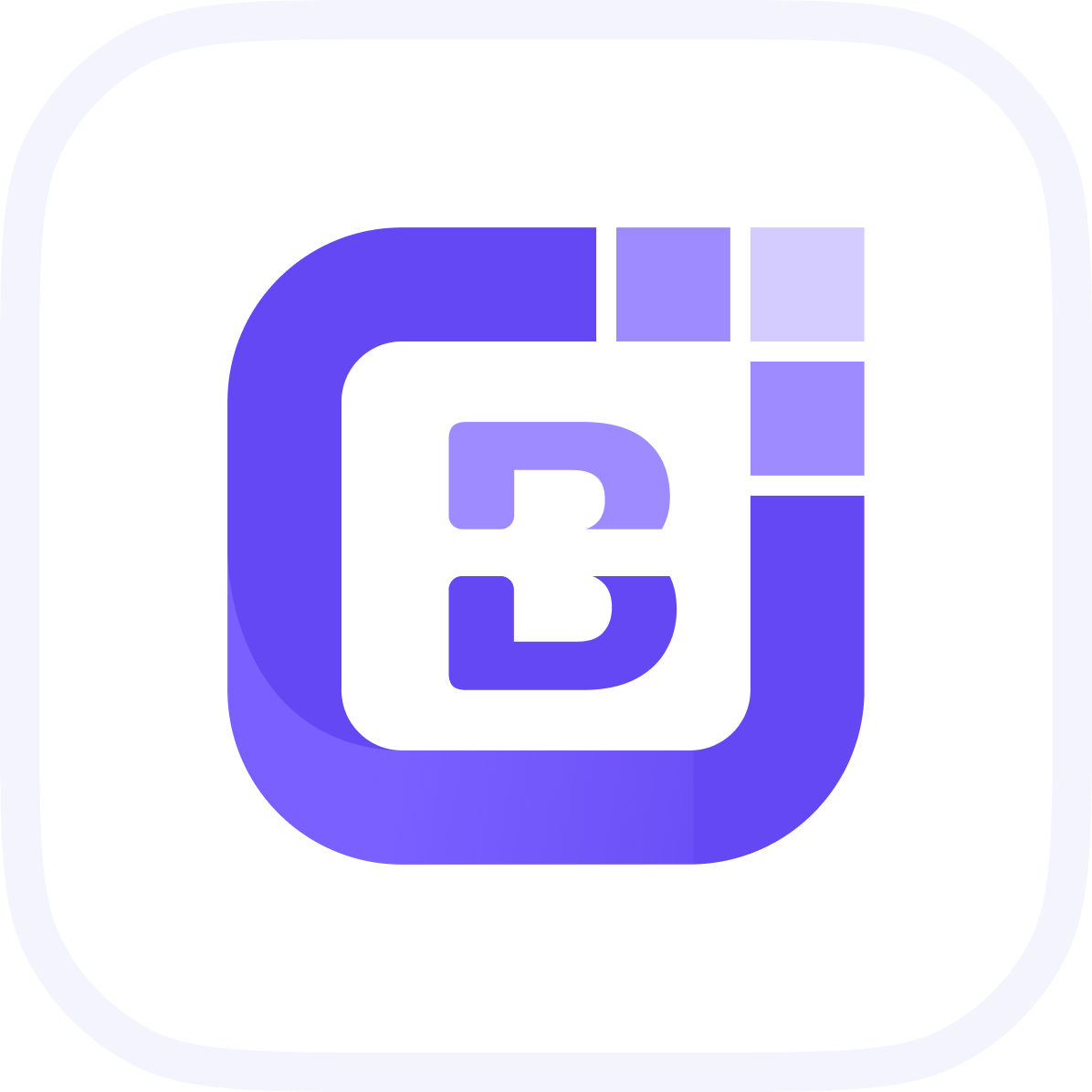Updated on 2025-06-30
views
5min read
There are many benefits to using Android Auto for Spotify music playback in a car, and the main one is improved safety while driving. This is because you can control playback using voice commands without touching your phone, and the large car display makes it easier to view what's playing on Spotify.
However, Spotify doesn't always work properly on Android Auto. Sometimes, Spotify will not load or play on Android Auto. Next, we’ll explore common cases of Spotify not working on Android Auto and walk you through effective solutions.
Common Cases of Spotify Not Working on Android Auto
Ever since June 2017, and perhaps even earlier, multiple Android users have flooded the official Spotify help forum to complain about issues they’ve been facing when using Spotify with Android Auto. Some errors range from the Spotify app failing to start to not even showing up entirely.
Case 1: Spotify doesn't seem to be working right now
Connect your phone to Android Auto with a USB cable but only receive the “Can’t work right now” prompt. However, other apps work normally on Android Auto.
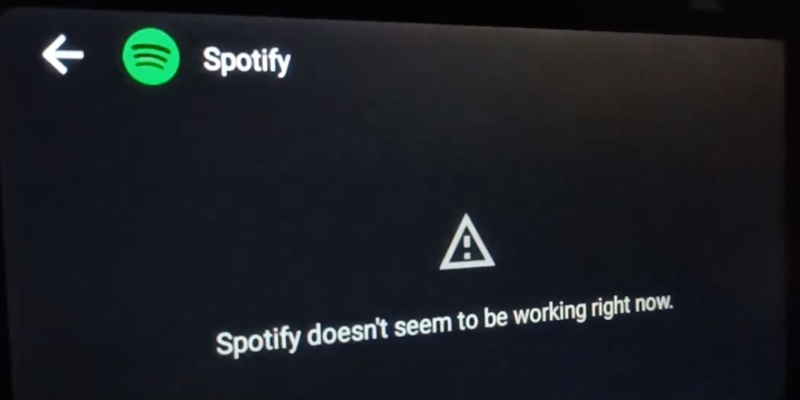
Case 2: Spotify can't play or load on Android Auto
When the phone is first connected to Android Auto, Spotify can still play music. After a few minutes, Spotify suddenly stops playing. When the phone is reconnected, Spotify can’t even load on Android Auto.
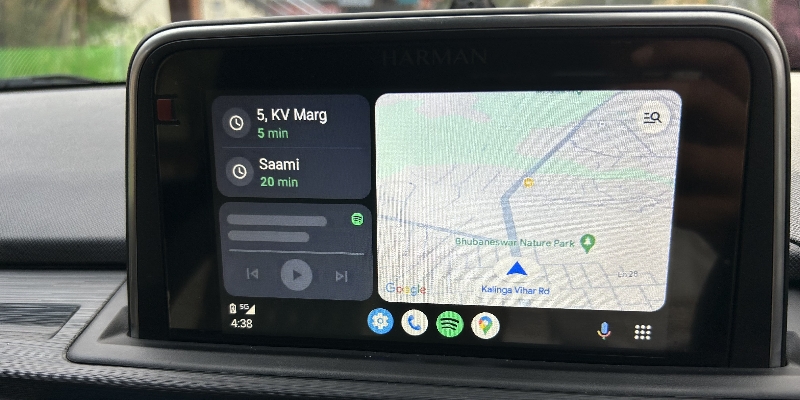
Case 3: Spotify doesn't show on Android Auto
When you want to add Spotify to the Android Auto app on your phone, you can’t find Spotify in the app list.
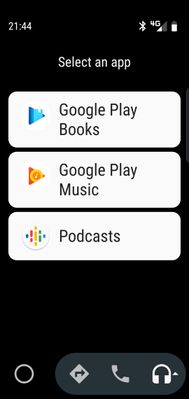
Quick Fixes for Spotify Not Working on Android Auto
Each of the fixes below is designed to address the above three main scenarios which are caused by device connection, Spotify glitches, improper settings, etc. Simply follow them to get Spotify back to work on Android Auto.
Fix 1. Use USB Connection Instead
If you are using Bluetooth to connect your phone and Android Auto, try to use a USB cable to build the connection instead. This is because a wired connection often provides better stability. If a USB cable is currently used, replace it with another one and check whether Spotify works again on Android Auto.
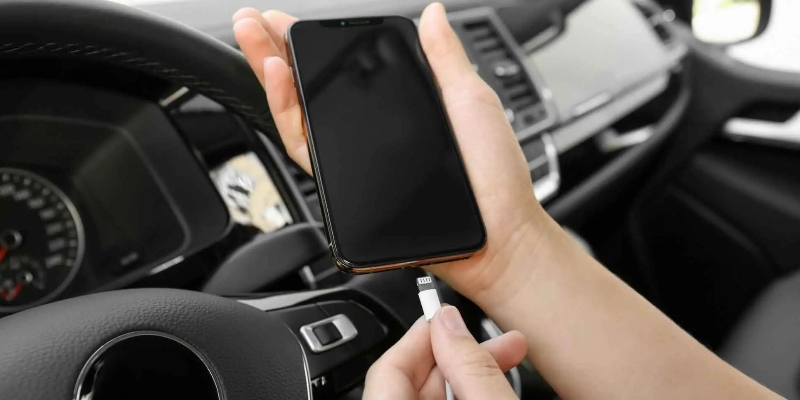
Fix 2: Clear Spotify Cache and Restart Your Phone
This fix can remove possible glitches causing the issue from both Spotify and phone. It’s approved to work by some online users. So, don’t hesitate to try it.
Steps on Android
- Open "Settings" on your Android phone and tap "App".
- Select "Spotify" from the list and tap "Storage".
- Press "Clear cache".
- Press “Power” + “Volume up” buttons at the same time and choose “Restart” to complete the process.
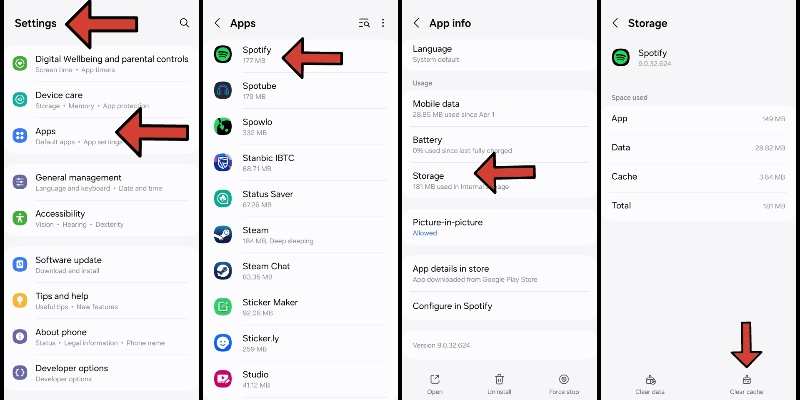
Steps on iPhone
- Launch Spotify and tap the gear icon on the top right to open its settings.
- Tap "Storage" > "Delete Cache".
- Confirm the selection by tapping "Delete cache" again.
- Press both “Power” and “Volume down” buttons until you see the power off slider. Then drag the slider to shut down your iPhone. After 30 seconds, start your phone again. For older models of iPhone, you just need to press the power button to reach the slider.
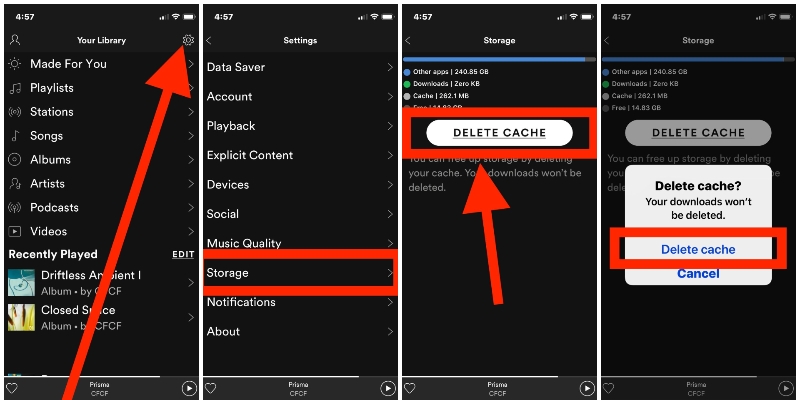
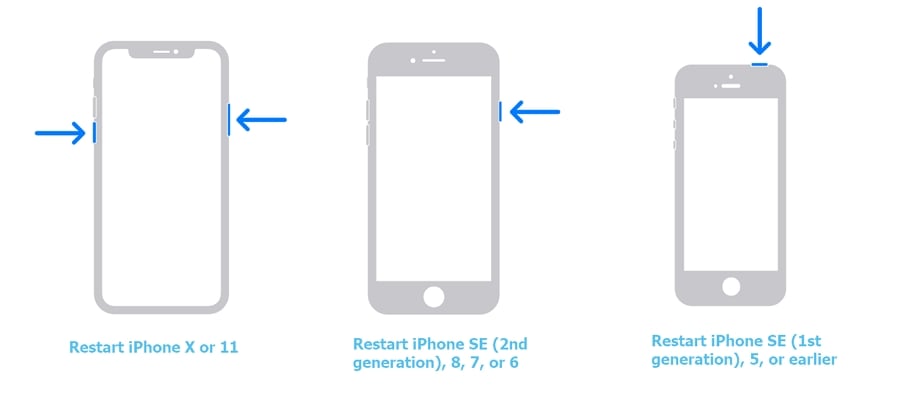
Fix 3. Enable Autoplay
When you enable Autoplay, the action prevents Android Auto from force-closing Spotify due to background restrictions, keeping playback stable. Here is how to use this fix on iPhone and Android.
- Launch Spotify on your phone, tap your avatar, and go to "Settings and Privacy".
- Tap "Playback", locate “Autoplay” and toggle it on if it is off.
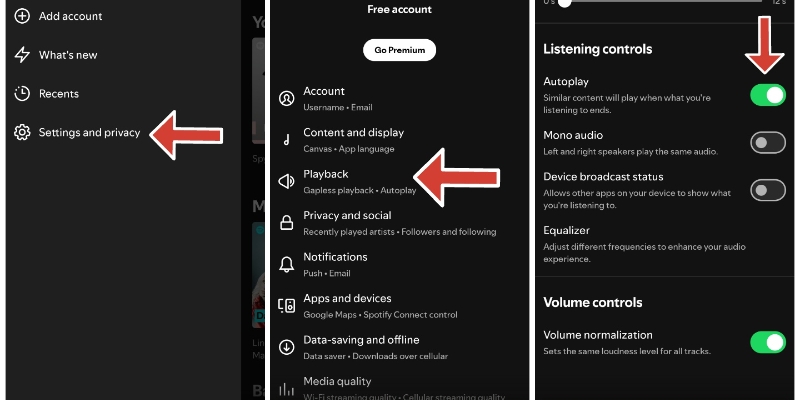
Fix 4. Turn on Device Broadcast Status
This Device Broadcast Status option helps Spotify communicate properly with Android Auto, but the setting is only available on Spotify Android currently. So, if you're using an iPhone, try any of the other options.
- Open the Spotify app and tap your profile picture in the upper left corner.
- Tap "Settings and Privacy" and then "Playback".
- From there, scroll down a bit to find the "Device Broadcast Status" option.
- Turn on "Device Broadcast Status".
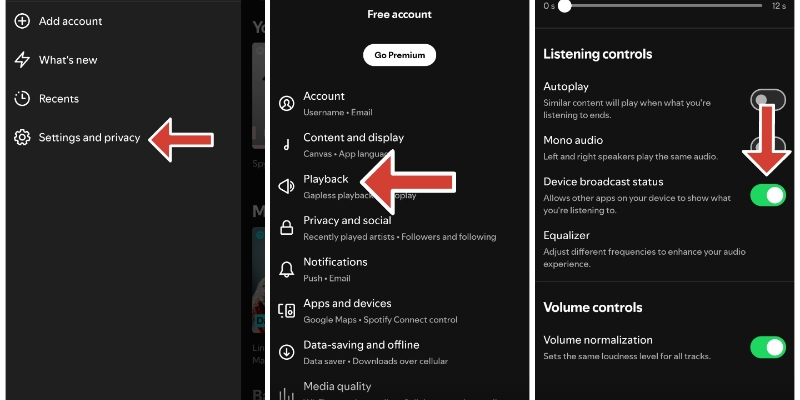
Fix 5. Change Spotify App Notifications
Doing this ensures that background activity is maintained and the glitch preventing Spotify from functioning properly on Android is resolved.
Steps on Android
- Go to "Settings" on your Android phone and tap "Notifications".
- Search for Spotify, choose it, and tap "Allow sound and vibration".
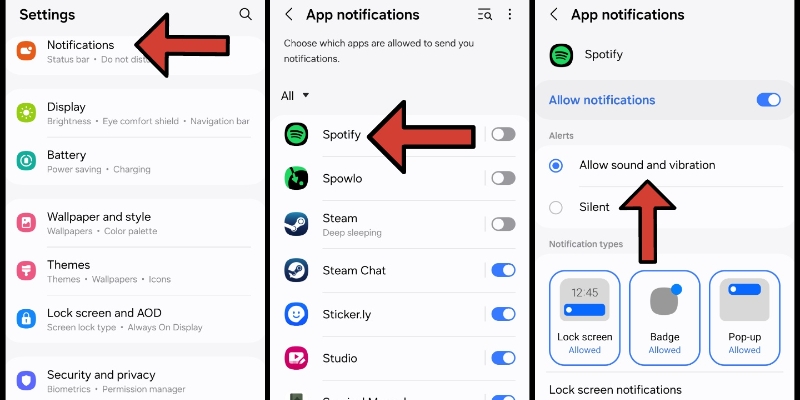
Steps on iPhone
- Open iPhone Settings and go to "Notifications".
- Tap "Spotify" and toggle on “Allow Notifications”.
- Finally, enable “Allow Notifications”.
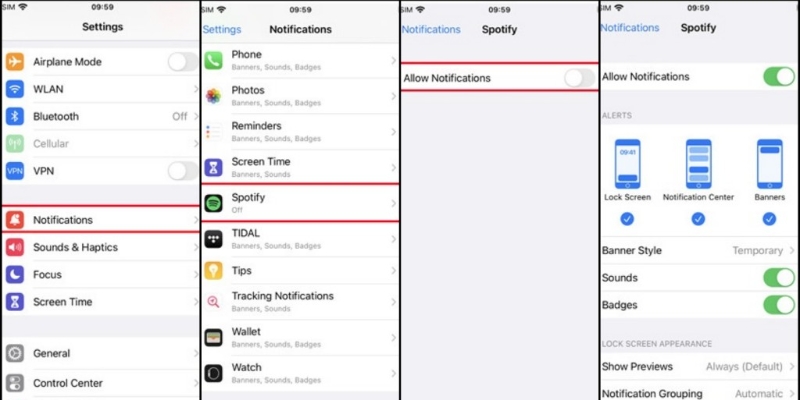
Fix 6. Force Exit Spotify and Then Run It
This works like a quick reboot but it goes deeper. You can try this way on Android and iPhone by following the steps below.
Steps on Android
- Open the Settings app and go to "Apps". Next, choose “Spotify”.
- Hit "Force Stop" at the bottom right.
- Tap "OK" to confirm the exit and then open Spotify again.
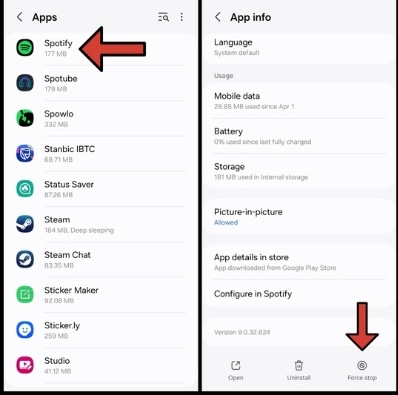
Steps on iPhone
- Pick up your phone and swipe upwards from the bottom edge, but pause midway.
- The "Recent Apps" screen will open up. Simply look for "Spotify" and swipe up to close it.
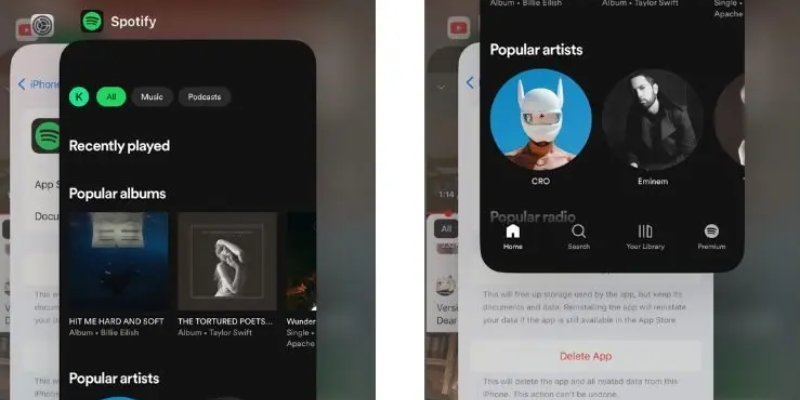
Fix 7. Enable Unknown Sources
Some third-party integrations require this option to function properly. Enabling “Unknown Sources” on Android devices lets Spotify bypass Android Auto’s strict app verification which often blocks playback for no apparent reason.
- First, go to your phone’s settings and tap "Connected devices".
- Scroll down and tap on "Android Auto".
- Scroll down again and tap "Version" 10 times to unlock "Developer Mode".
- Tap the 3-dot icon at the top right of the screen and then tap "Developer Settings".
- Scroll down one more time and tick "Unknown Sources".
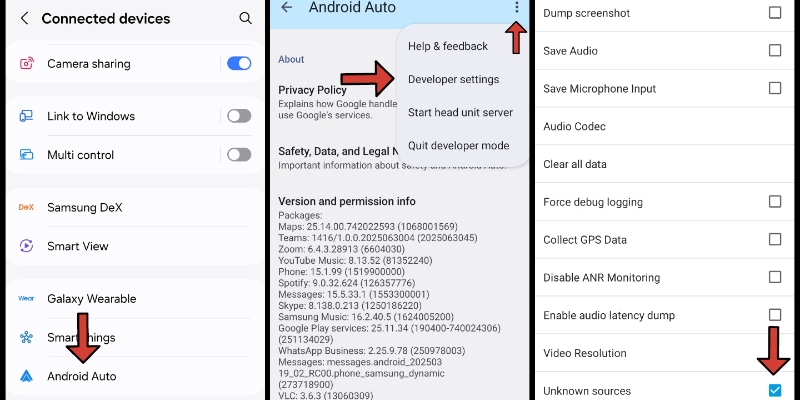
Fix 8. Turn off Battery Optimization for Spotify
Choosing this option guarantees your phone won’t kill Spotify’s background processes and prevent disconnections in Android Auto.
Steps for Android
- Pick up your phone, go to "Settings", and tap "Apps".
- Navigate to "Spotify" and tap "Battery".
- Then, choose "Unrestricted".
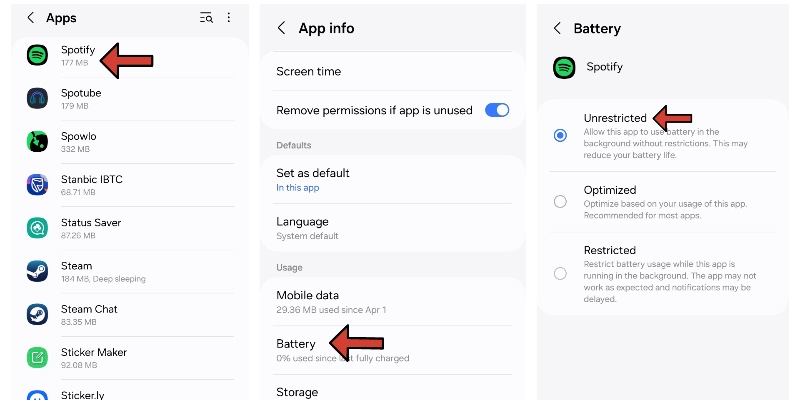
Steps for iPhone
- Open your iPhone’s "Settings" and go to "Battery".
- Turn off “Low Battery Mode” by sliding its toggle.
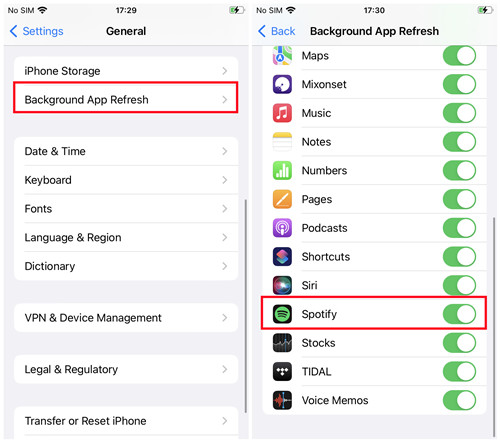
Ultimate Fix for Spotify Not Working on Android Auto
This last fix is the most effective because it tackles the issue in one go and you don’t need to try the fixes one by one. Besides, it lets you use Spotify with Android Auto offline without premium. What you need is a tool called StreamFox for Music that converts Spotify music locally. Therefore, you can transfer Spotify music to a USB drive and play Spotify on Android Auto without the app.
StreamFox for Music, the Eassiy All-in-one Music Converter, is a powerful music converter. It converts Spotify tracks to high-quality MP3 (320kbps), FLAC, or WAV formats for universal compatibility and at 10x speed while preserving original ID3 tags for perfect organization. Its batch-download feature handles entire playlists, albums, and podcasts in one go. It makes it available to listen to Spotify on a car that even doesn’t support Android Auto or Apple CarPlay.
Eassiy All-in-one Music Converter
Download music from Spotify, Apple Music, Amazon Music, and three other music services as local MP3 in 320kbps with ID3 tags retained.
Key Features
- Built-in Spotify web player to directly select songs for conversion.
- Retain full ID3 tags including song titles, artist names, cover art, etc.
- Support converting audio from other music services like Amazon Music, YouTube Music, and Apple Music.
- No obtrusive ads to ruin the usage experience.
How to Save Spotify to USB
Step 1. Download and install the macOS or Windows variant of the software. Then, start it and click “Spotify” to proceed.
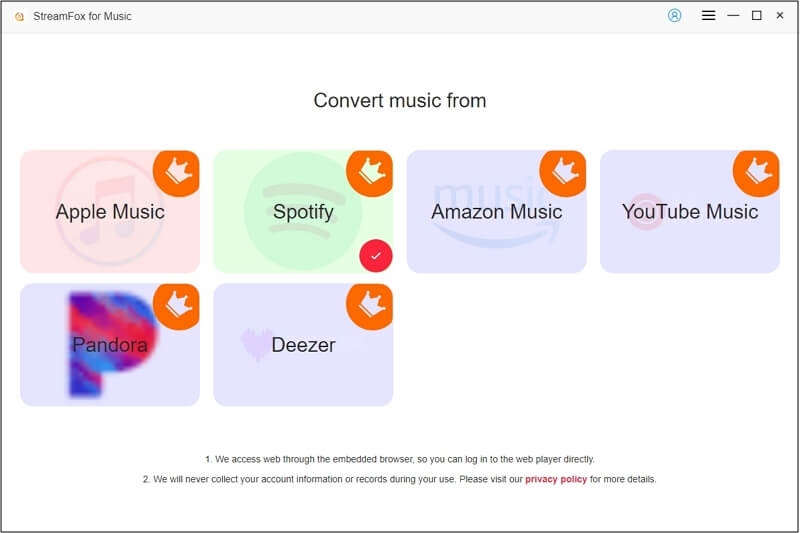
Step 2. Click the white “Log in” button on the top right of the software. Enter your Spotify account details and hit “Enter” to continue.
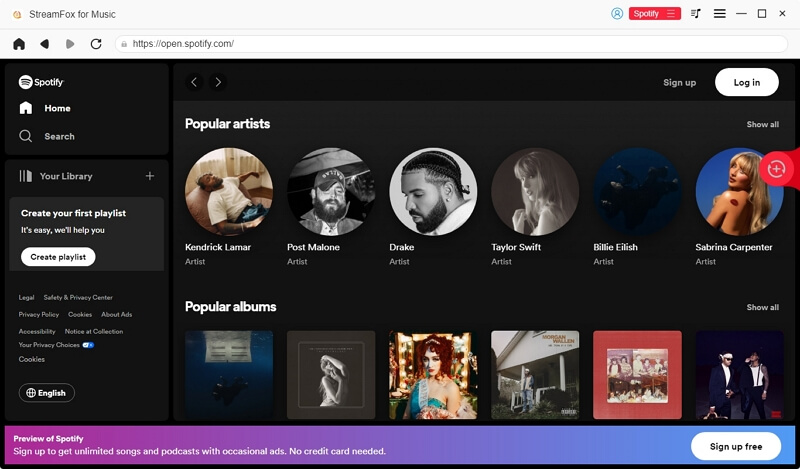
Step 3. Look for the songs, albums, playlists, or podcasts you want to download. Then drag and drop them onto the Conversion List button on the right side of the software (a red plus icon “+”).
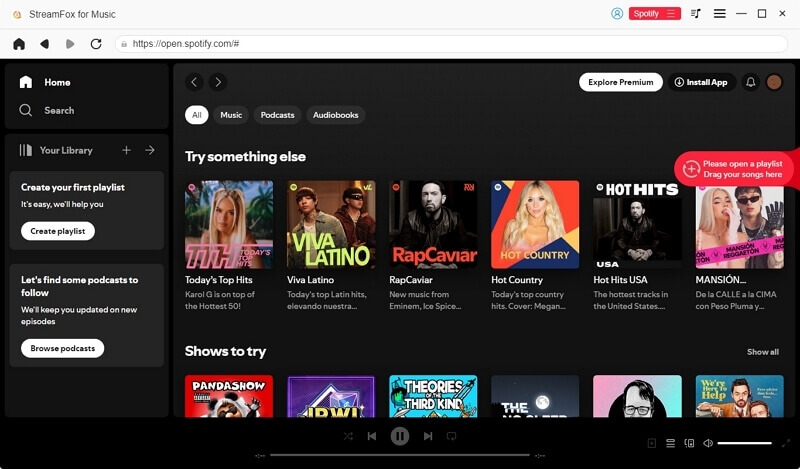
Step 4. The Conversion List window displays all your selected tracks. From here, you can customize the output format and choose a storage location.
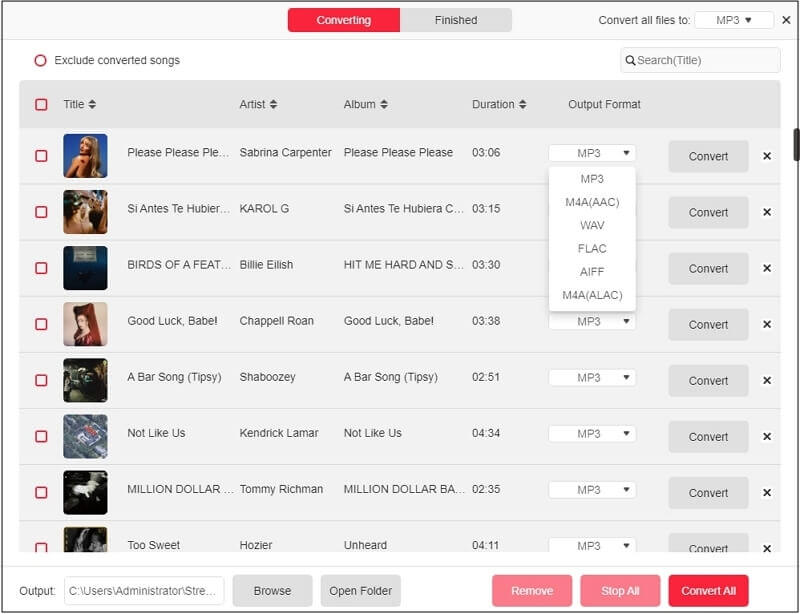
Step 5. Click the red “Convert All” button and StreamFox for Music will process your songs in seconds (for individual tracks) or minutes (for full playlists). When the conversion completes, simply click “View Output File” to access your songs in the destination folder.
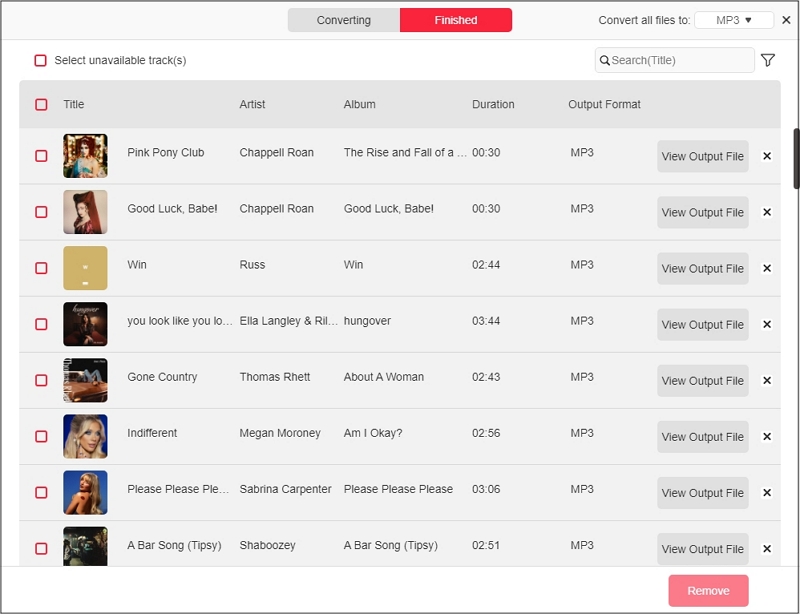
Step 6. Plug your USB drive into your computer and copy and paste the converted songs. Before transferring them, make sure the USB drive is formatted as exFAT or FAT32 for compatibility with Android Auto.
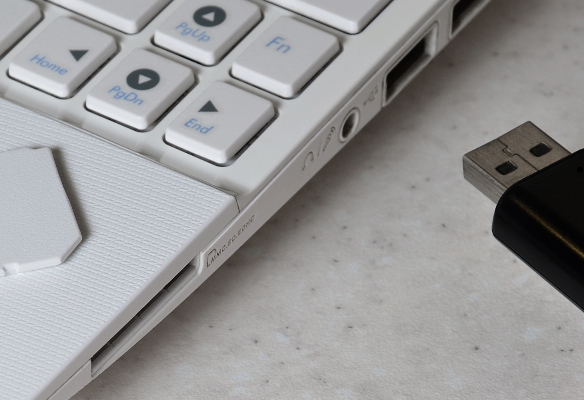
Step 7. Next, plug the USB drive into your car’s USB port, select “Media” and then “USB” on your car’s screen, and then click “Play” to access and play your songs.

Conclusion
Do you see how quick and easy it can be to fix Spotify not working on Android Auto error in common cases? All these quick fixes work great commonly. However, if they don’t work for you or you want an easier and quicker way to get Spotify to work on your Android Auto again, just convert the Spotify songs using StreamFox for Music and listen to them on Android Auto via USB!


